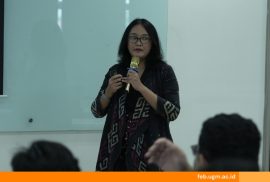The introduction and understanding of philosophy and research approaches are crucial for researchers in conducting their work. This is the essence of holding a webinar series with the theme “Philosophy and Approaches to Accounting and Business Research” by the Accounting Laboratory, Department of Accounting, FEB UGM together with the Master of Science and Doctoral (MD) Study Program of FEB UGM, which consists of 7 series and discusses various paradigms for each session. On Friday (30/04), the fourth session of the webinar series was successfully held, discussing the philosophical and methodological aspects of the phenomenology paradigm as the topic.
Phenomenology can be defined as the study of a person’s life experiences or a method for studying how individuals subjectively experience and give meaning to these phenomena. This explanation was given by Rijadh Djatu Winardi, S.E., Ak., M.Sc., CFE, as the speaker on the occasion. According to Rijadh, often what we perceive will be different from what we feel. “Phenomenology tries to capture not only what we perceive in our senses, but also tries to study the structure of our thoughts about an object we see,” he added.
Based on his explanation, the phenomenological paradigm is also closely related to the study of consciousness. Several methods can be applied in conducting conscious experience studies by describing them or interpreting them by relating them to the relevant context. According to Husserl, regarding pure/transcendental phenomenological theory, there are six key concepts: intentionality, noema, noesis, epoche (phenomenological reduction), eidetic reduction, and the essence of experience.
Meanwhile, according to Heidegger, regarding the theory of hermeneutic phenomenology, reduction is not possible; to understand the phenomenon, it is necessary to know the individual who experienced it. Unlike the previous theory, interpretation is an integral part of understanding this paradigm according to hermeneutic phenomenology. Additionally, phenomenology as a methodology can be divided into descriptive and interpretive phenomenologies.
At the end of his presentation, Rijadh also explained the strengths and limitations of the phenomenological paradigm. The phenomenological paradigm is considered suitable for developing an understanding of complex issues and is also a powerful tool for gaining insight into lived experiences and human existence. This paradigm also allows opportunities to expand the research boundaries and enrich the empirical data from a study. On the other hand, phenomenology can be “daunting” because of the need to understand aspects that are somewhat difficult and large amounts of data. Phenomenology can also limit the generalizability of results and put into question the objective “truth” of any conclusions drawn.
Reportage: Kirana Lalita Pristy/Sony Budiarso.




